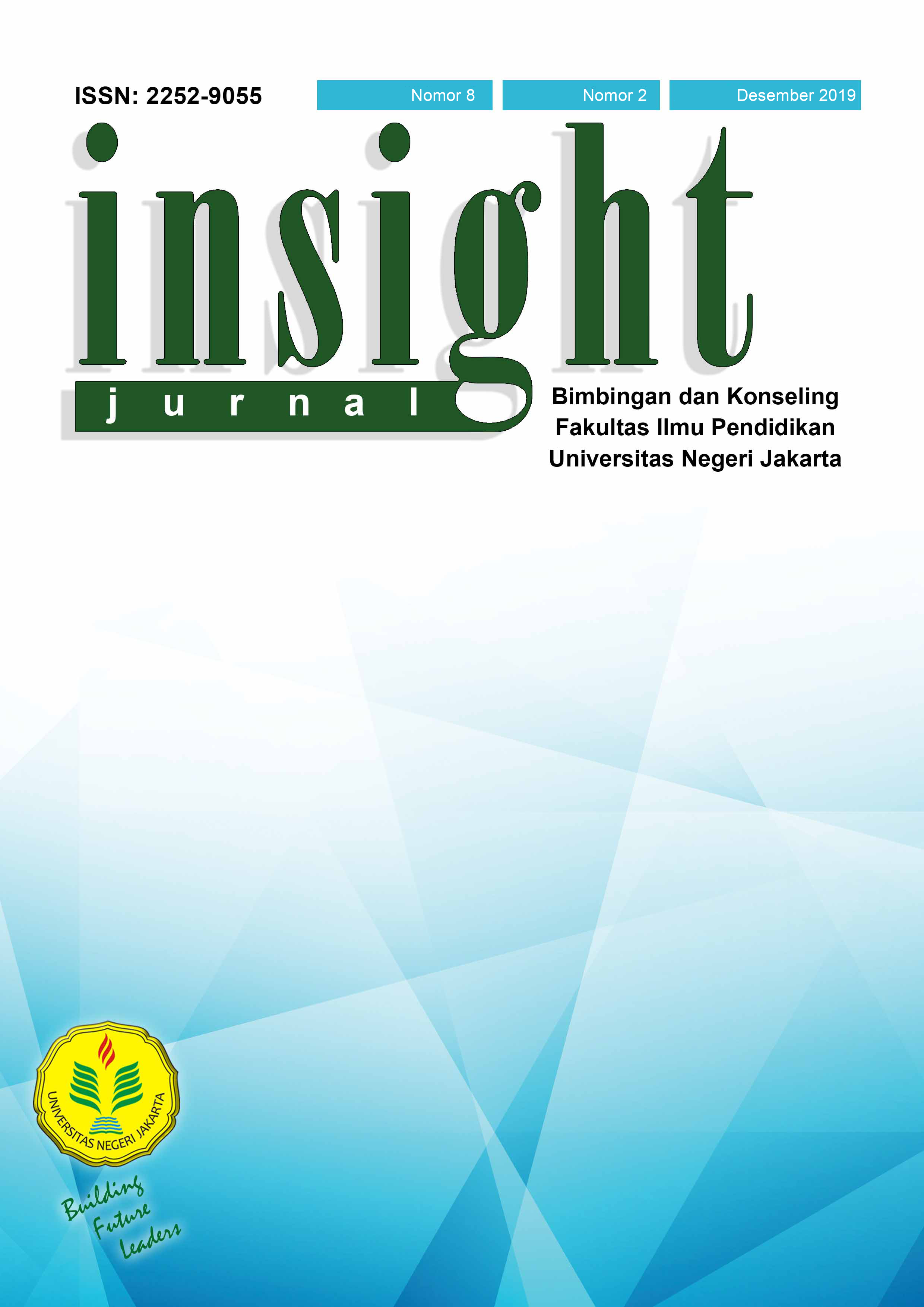Suatu Kajian Kepustakaan Kekerasan dalam Berpacaran yang Dialami Siswa dalam Perspektif ACT
DOI:
https://doi.org/10.21009/INSIGHT.082.09Keywords:
Acceptante and Commitment therapy (ACT), Kekerasan dalam berpacaran (KDP), siswaAbstract
Tulisan ini berfokus untuk melihat keefektifan Acceptance and Commitment Therapy pada siswa yang mengalami kekerasan dalam berpacaran (KDP). Data diperoleh melalui mencari data mengenai hal-hal atau variabel yang berupa catatan, buku, makalah atau artikel, jurnal, dan sebagainya. Berdasarkan pencarian hasil kajian kepustakaan kekerasan dalam berpacaran yang dialami siswa dalam perspective ACT dapat disimpulkan bahwa acceptance and commitment therapy (ACT) secara efektif menurunkan gejala depresi seperti gangguan belajar, perasaan tidak berharga, lekas marah, penarikan sosial, pikiran yang gelisah, penarikan social, gangguan perilaku, tingkat kecemasan, gejala stress, dan perilaku kekerasan. ACT mampu memperbaiki kesejahteraan siswa dan mampu mendorong siswa untuk dapat berkomitmen dengan dirinya. Bagi para siswa yang mengalami kekerasan dalam berpacaran baik sebagai korban maupun pelaku dapat ditolong menggunakan Acceptance and Commitment Therapy (ACT) karena dapat menurunkan dampak-dampak yang timbul akibat kekerasan dalam berpacaran yaitu dampak psikis dan sosial yang muncul seperti stres, depresi, cemas berlebih, sulit konsentrasi, sulit tidur, memiliki harga diri yang rendah.
References
Burckhardt, R., Manicavasagar, V., Batterham, P. J., & Hadzi-Pavlovic, D. (2016). A randomized controlled trial of strong minds: A school-based mental health program combining acceptance and commitment therapy and positive psychology. Journal of School Psychology, 57, 41–52. https://doi.org/10.1016/j.jsp.2016.05.008
Halliburton, A. E., & Cooper, L. D. (2015). Applications and adaptations of Acceptance and Commitment Therapy (ACT) for adolescents. Journal of Contextual Behavioral Science, 4(1), 1–11. https://doi.org/10.1016/j.jcbs.2015.01.002
Harris, R. (2009). ACT made simple: An easy-to-read primer on acceptance and commitment therapy. Oakland: New Harbinger Publications.
Hayes, S. C., Luoma, J. B., Bond, F. W., Masuda, A., & Lillis, J. (2006). Acceptance and Commitment Therapy: Model, processes and outcomes. Behaviour Research and Therapy, 44(1), 1–25. https://doi.org/10.1016/j.brat.2005.06.006
Hayes, S. C., & Pankey, J. (2002). Experiential avoidance, cognitive fusion, and an ACT approach to anorexia nervosa. Cognitive and Behavioral Practice, 9(3), 243–247. https://doi.org/10.1016/S1077-7229(02)80055-4
Hayes, S. C., Wilson, K. G., Gifford, E. V., Bissett, R., Piasecki, M., Batten, S. V., … Gregg, J. (2004). A Preliminary trial of twelve-step facilitation and acceptance and commitment therapy with polysubstance-abusing methadone-maintained opiate addicts. Behavior Therapy, 35(4), 667–688. https://doi.org/10.1016/S0005-7894(04)80014-5
Klaus, K. (1993). Analisis Isi Pengantar Teori dan Metodologi. Jakarta: Raja Grafindo Persada.
Krahe, B. (2001). Social psychology. The social psychology of aggression. Psychology Press.
Livheim, F., Hayes, L., Ghaderi, A., Magnusdottir, T., Högfeldt, A., Rowse, J., … Tengström, A. (2015). The Effectiveness of Acceptance and Commitment Therapy for Adolescent Mental Health: Swedish and Australian Pilot Outcomes. Journal of Child and Family Studies, 24(4), 1016–1030. https://doi.org/10.1007/s10826-014-9912-9
Marcus, R. F. (2007). Aggression and Violence in Adolescence. https://doi.org/10.1017/CBO9780511611292
Murray, J. (2007). But I Love Him: Protecting Your Daughter from Controlling, Abusive dating Relationship. New York: Harper Collins.
Murrell, A. R., & Scherbarth, A. J. (2006). State of the research & literature address: ACT with children, adolescents and parents. International Journal of Behavioral Consultation and Therapy, 2(4), 531–543. https://doi.org/10.1037/h0101005
Nazir, M. (2003). Metode Penelitian. Jakarta: Ghalia Indonesia.
Nikkhah, M., & Arefi, M. (2015). Effectiveness of Theapy with respect to acceptance and commitment on students’ anxiety with test anxious in Esfahan city. Journal of Scientific Research and Development, 2(4), 190–194.
Prasastisiwi, D. (2017). Penerapan Konseling Acceptance and Commitment Therapy untuk Menurunkan Stres Akademik pada Siswa Kelas XI SMAN 3 Tuban. Jurnal BK UNESA, 7(3), 188–194.
Safitri, W. A. (2013). Dampak Kekerasan Dalam Berpacaran (Studi Kasus pada Mahasiswa Fakultas Ilmu Sosial dan Ilmu Politik Universitas Jember). Jember: Universitas Jember.
Sari, A. N. (2016). Penerapan Acceptance And Commitment Therapy Untuk Mengurangi Kecemasan Siswa Pada Pelajaran Fisika Kelas XI SMAN 3 Surabaya. Jurnal BK UNESA, 6(2), 1–6.
Sulistiowati, N. M. D., Keliat, B. A., & Wardani, I. Y. (2014). Pengaruh Acceptance And Commitment Therapy Terhadap Gejala Dan Kemampuan Klien Dengan Resiko Perilaku Kekerasan. Jurnal Keperawatan Jiwa, 2(1), 51–57.
Utari, E. D. (2017). Efektivitas Penggunaan Teknik Bermain Peran (Role Playing) Dalam Bimbingan Pribadi Sosial untuk Meningkatkan Interaksi Sosial pada Siswa Kelas VIII SMP Negeri 8 Kediri Tahun Pelajaran 2016/2017. Kediri: UN PGRI KEDIRI.
Warkentin, J. B. (2008). Dating violence and sexual assault among college men: Co-occurrence, predictors, and differentiating factors. Dissertation Abstracts International: Section B: The Sciences and Engineering, 69(2-B), 1313.
Woidneck, M. R., Morrison, K. L., & Twohig, M. P. (2014). Acceptance and Commitment Therapy for the Treatment of Posttraumatic Stress Among Adolescents. Behavior Modification, 38(4), 451–476. https://doi.org/10.1177/0145445513510527
Downloads
Published
Issue
Section
License
Authors who publish with this Journal agree to the following terms:
- Author retain copyright and grant the journal right of first publication with the work simultaneously licensed under a creative commons attribution licensethat allow others to share the work within an acknowledgement of the work’s authorship and initial publication of this journal.
- Authors are able to enter into separate, additional contractual arrangementfor the non-exclusive distribution of the journal’s published version of the work (e.g. acknowledgement of its initial publication in this journal).
- Authors are permitted and encouraged to post their work online(e.g. in institutional repositories or on their websites) prior to and during the submission process, as it can lead to productive exchanges, as well as earlier and greater citation of published works.
Users/public use of this website will be licensed to CC BY







